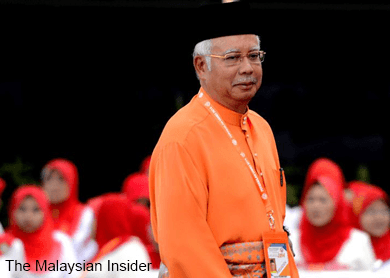
KUALA LUMPUR (Mar 24): Prime Minister Datuk Seri Najib Razak could rely on the judiciary for an escape route to remain non-committal about Barisan Nasional's stand on the contentious hudud issue, sources told The Malaysian Insider.
This is after BN component party Gerakan filed a suit in the Kota Baru High Court to challenge the constitutionality of the Kelantan Shariah Criminal Code.
Sources told The Malaysian Insider that lawyers for the multiracial party were now preparing to have the suit transferred from the Kota Baru High Court to the Federal Court in Putrajaya.
"They are relying on Sections 84 and 85 of the Courts of Judicature Act 1964 for the apex court to decide on whether hudud could be implemented under the present constitutional scheme," sources said.
They added that Najib and other Umno leaders would now have an excuse from making public comments on the hudud issue on the grounds of sub judice and would wait for the outcome of the court proceedings.
"BN could now absolve responsibility even if the courts make a ruling for or against the implementation of hudud," they said.
Gerakan's suit was filed last Wednesday, the same day as the Shariah Criminal Code II Enactment 1993 (Amendment 2015) was tabled in the Kelantan legislative assembly.
All 44 assemblymen voted in favour of the bill.
Its easy passage was expected as PAS enjoyed a two-thirds majority in the legislative assembly and, furthermore, the Sultan of Kelantan, Sultan Muhammad V, had also voiced his support for the implementation of hudud in the state.
The assemblymen, comprising 31 from PAS, 12 from Umno and one from PKR, only took two days to debate the bill, indicating that even the state's opposition (Umno) was willing to give the state government the space and opportunity to implement hudud.
Hudud provides for death by stoning for adultery with married partners, whipping of between 40 times and 80 times for consuming alcohol and amputation of limbs for theft.
Last Thursday, Najib met leaders of 12 BN component parties after the Kelantan assembly passed the bill.
Sin Chew Daily quoted MCA president Datuk Seri Liow Tiong Lai as saying most ministers were against Kelantan's hudud as it was unconstitutional.
Liow, who is transport minister, said at a Cabinet meeting on Friday, most of the ministers present were of the opinion that PAS's push for hudud was an attempt to turn Malaysia into a theocratic state.
He said the Cabinet was very concerned and wanted to handle the "PAS conspiracy" carefully.
"The Cabinet emphasised that the hudud bill tabled by the Kelantan government is not according to the spirit of the country's constitution," Liow was quoted as saying.
He reportedly reiterated MCA's stand against hudud during the meeting, and had urged his colleagues in the Cabinet to uphold the constitution.
Liow said Najib was supposed to make an announcement in a day or two but the prime minister has yet to announce the official stand.
PAS president and Marang MP Datuk Seri Abdul Hadi Awang is seeking to table a private member’s bill in Parliament during the current meeting to enable Kelantan to enforce hudud laws in the state, despite opposition from allies PKR and DAP.
The bill is to amend the Shariah Courts Act (Criminal Jurisdiction) 1965, which limits the power of the Shariah courts to a maximum penalty of RM3,000 in fine, five years jail and six strokes of the rotan.
However, PKR and DAP have said hudud laws were not part of the PR pact's common stand and have spoken out against the bill.
DAP met last night to review its ties with PR, after having been “stabbed” by PAS when Kelantan tabled and passed amendments.
PKR on Saturday had announced the party would not support PAS's hudud bill should it table it in Parliament, saying the Islamist party acted unilaterally in the matter and had gone against the Pakatan Rakyat leadership council's decision.
The party added that it, too, opposed the bill due to the principles of Fiqh Al-Awlawiyyat (understanding priorities), Maslahat Ummah (public interests) and the Maqasid Syariah (higher objectives of Shariah).